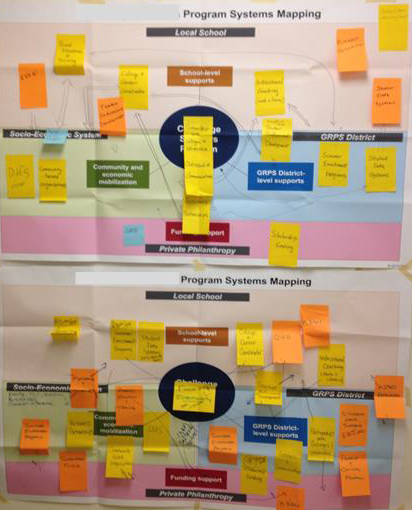Earlier this month, my colleagues Srik Gopal and Hallie Preskill described the characteristics of complex systems and introduced a framework for applying systems thinking to various stages of a large-scale social change effort. Soon, we will begin sharing detailed guidance for using different tools to support systems thinking and practice. Here, I briefly describe these tools and introduce a matrix that helps clarify when and how to use them.
As we have worked to integrate systems thinking into our work at FSG, we realized that the tools we’d historically used to understand problems, develop new strategies, and evaluate progress toward goals were inadequate for addressing the complexities of large-scale social and environmental issues. We started looking for new techniques and approaches to help us better understand the context around an issue or a system, the connections among actors and organizations within a system, the patterns that seem to govern a system’s behavior, and the diverse perspectives of those that influence and are influenced by a system.
The first set of tools we adapted to our work include 4 mapping tools that help individuals visualize a system and 2 conversational tools that bring forward different perspectives on what a system looks like or how it functions.
Six tools that support systems thinking and practice
This is not, of course, a comprehensive list of all tools that can be used to support systems thinking and practice; in fact, we are continuing to adapt and develop several additional tools, which we hope to begin sharing with the field later this year.
Beginning next month, we will introduce 1 tool each month, providing an overview of what the tool is and how it can support systems thinking and change, offering guidance on how to use the tool in practice (e.g., key steps in the process, time and resources required), and sharing a real-life case study that describes how a nonprofit, a collective impact initiative, or a funder used the tool to advance their objectives. Before we introduce each tool in detail, we wanted to emphasize 2 important lessons we’ve learned, summarized by common sayings:
“A time to every purpose”
We acknowledge that it can be difficult to know which tool is most appropriate for a given purpose when you begin to experiment with system tools. Based on our own experiences, we developed the matrix (preview below) to provide guidance on the most appropriate tool(s) to use at different points in the systems thinking cycle, and for different learning objectives.
“It’s about the journey, not just the destination”

The second key lesson we learned is that there is significant value in the process these tools facilitate and the conversations they stimulate—not just in the products they produce. For example, this image shows the output of an actor mapping session with stakeholders. As you can see, the image is messy, disorganized, and difficult for an outsider to interpret.
However, the process of developing the map—of engaging individuals in conversation about who is involved in a system, how they are connected to other actors, the strength of their relationships, where there is a need for greater coordination or funding—was invaluable. The draft map was iterated upon a few more times before stakeholders agreed upon a “good enough” version, which was revisited again in a few months. We encourage readers to appropriately balance their expectations about the importance of the process, and not just the appearance of its output.
I’ve included a first look at the Systems Tools Matrix below, which will be available for download with the tools in the coming months. We welcome your feedback and comments on the Systems Thinking Framework and the System Tools Matrix.
See all systems thinking resources >
